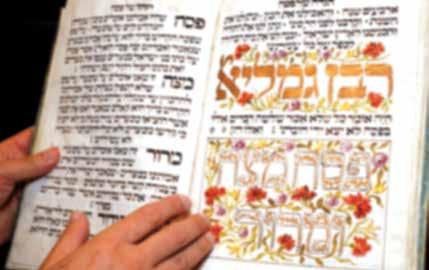
10 minute read
Parsha Ponderings
Parsha Ponderings Parsha Yisro On Your Mind
By Rabbi Shmuel Kamenetzky
Hashem gave the Torah to the Jews, and with a thunderous voice, called out the first of the Ten Commandments, “I am Hashem, your G-d, Who has taken you out of Egypt.”
The century-old question is asked by a variety of commentators: Why did the Al-mighty attribute His power over the world with this particular fact?
Why not declare, “I am Hashem, Who created Heaven and Earth, along with everything in it”?
The Gerrer Rebbe, Rav Yisroel Alter, known as the “Beis Yisroel,” had a chassid who came to him to bid farewell and receive his blessing before he departed on a business trip to France. The Rebbe gave him his blessing and wished him much success, and then asked of him an unusual request.
“In France,” the Rebbe said, “There is a unique brand of cigars that is sold. Please find out where they sell those cigars and bring me back a box.”
The Rebbe then described exactly which cigars he wanted.
The chassid, although taken aback by the Rebbe’s strange request, readily accepted his mission, and promised the Rebbe that he would do his best to bring back the cigars.
When he arrived in France, the chassid tried to locate those cigars, yet he was unsuccessful. He went from store to store, and even traveled to a few different towns to find those cigars, yet no one carried them. He even skipped a few scheduled meetings in order to spend more time fulfilling his Rebbe’s request, yet he was still unsuccessful.
After spending two weeks in France, with the majority of his time and efforts spent on locating those said cigars, he was forced to return home, disappointed that he had nothing to bring his Rebbe.
Upon his return, he went back into the Rebbe, and cried out, “Rebbe! I looked all over, and even searched
in many towns, yet I don’t have the cigars! I’m terribly sorry!”
Rav Yisroel looked at his chassid, and asked him, “Do you think I needed those cigars? I don’t need those cigars. But I knew that you were entering into a foreign country where their values contradict the values of the Torah. I was afraid that during your stay in France, you would be influenced by the temptations that await you there. So, I told you to look for those cigars, and I knew that you would be thinking about your Rebbe the entire time!
“That is was saved you from spiritual downfall!”
My grandfather Rav Binyamin Kamenetzky, zt”l, would often quote the answer of Rav Aaron Baskt, zt”l, (known as “Rav Archik”) the Rav of Shavel, a small village in Lithuania near the town where he, as a young student, attended yeshiva. Rav Binyamin would eat a weekly meal at the home of the Rav Archik and would often talk about his brilliance in Talmudic knowledge, kindness, and distinguished and saintly way of life. Rav Bakst answered the above
question with a parable. A father teaches his son to walk and holds onto him, lest he fall and hurt himself. As the son adapts to his newfound abilities, his father lets go of him, yet he remains close to watch and ensure that the child remains safe. The child, in turn, gains confidence in his own abilities, while trusting that his father is still protecting him, albeit from afar.
Hashem treated the Jews in Egypt like infants. They were, indeed, a newborn nation. Hashem held onto them, showing them open miracles, one after another, enabling them to completely feel His presence. But as the Jewish nation traveled to their own destiny, they matured as a nation, and Hashem “loosened His grip” and no longer allowed his miracles to be unrestricted and easily noticed. Despite that, the Jewish Nation is expected to know and to feel the presence of Hashem, through the disguise of nature. He is watching us and every move we make, ensuring our safety.
Hashem taught us this lesson at Sinai. The generation of Yetziyas Mitzrayim was not alive at the creation of the world, and therefore could not connect to it to relive that inspiration. Yet they all remembered the miracles of the Exodus. Hashem wanted to remind them of those great miracles as a lesson for us all in the future.
For down the road of life, we will always need to look back at those miracles which we experienced in order to realize and appreciate the small miracles. Those small miracles are the hints of Divine intervention in our lives, about which we must think constantly.
Rabbi Shmuel Kamenetzky is the Director of Advancement at Yeshiva of South Shore – Yeshiva Toras Chaim Beis Binyamin. He is currently compiling the Torah thoughts from his grandfather, Rav Binyamin Kamenetzky, zt”l, into print, in Hebrew and English. If you have any stories or divrei Torah to share from his grandfather, or to subscribe to receive a weekly dvar Torah from Rav Binyamin Kamenetzky’s teachings, you can email him at skamenetzky@yoss.org.

Delving into the Daf
Made to Order
By Rabbi Avrohom Sebrow
In the English language there is an order for descriptive words. Most native English speakers have acquired an innate feel for the right way to express a sentence. However, if one would be put on the spot to express the rule, it would be exceedingly difficult. Mark Forsyth put the rule to text in his book, The Elements of Eloquence: How to Turn the Perfect English Phrase. He writes, “Adjectives, absolutely have to be in this order: opinion-size-age-shape-colour-origin-material-purpose Noun. So you can have a lovely little old rectangular green French silver whittling knife. But if you mess with that order in the slightest, you’ll sound like a maniac.” Another shorter example is little green monsters. No one would say green little monsters.
However, the order of those words is just based on convention. When it comes to sacred texts, however, every word belongs in its exact place for a reason. Therefore, this article and much of Torah has been written about the reversal of two words.
At the end of Maggid, we recite a blessing. We ask Hashem to help us observe other holidays with the Beis Hamikdash already built, and we will eat there from “hazavachim u’min hapesachim – we will eat there from the sacrifices and the Passover sacrifices.” One understanding of this phrase is that we are asking Hashem that we should be able to observe Pesach properly in the future with the Korban Chagigah and a Korban Pesach. The Korban Pesach was offered on the 14th on Nissan. Often, the Korban Pesach was accompanied by a Korban Chagigah as well.
There is a halacha that the Korban Pesach has to be eaten when mostly full. (Stated in another way, one should be full after eating the Korban Pesach.) There are two primary reasons for this halacha. One is that this manner of eating is considered the most respectable for the Korban Pesach. We don’t want the Korban Pesach to be consumed like an appetizer or side dish. The Korban Pesach should be the mainstay of the Pesach meal, and one should be full after eating it.
The Yerushalmi offers a different reason. There is a special injunction in the Torah against breaking the bones of the Korban Pesach. If someone would consume the korban while he was very hungry, he may come to break the bones to get to the meat more quickly. Therefore, the rabbis instituted that the Korban Pesach be eaten when mostly full, so that one is less likely to break the bones to get to the meat.
In order to ensure that the Korban Pesach was consumed on a mostly full stomach, a Korban Chagigah was offered in conjunction with the Korban Pesach. The Chagigah was eaten first, and only afterwards was the Korban Pesach eaten.
We can now readily understand the phraseology in the Haggadah. We hope that next Pesach we will be in Yerushalayim and eat the Chagigah sacrifice and only afterwards eat the Pesach sacrifice. That is why the word zevachim precedes the word pesachim. However, the Mishnah in Pesachim (69b) states that the Korban Chagigah was not brought on a year like this year, when the 14th of Nissan, erev Pesach, fell out on Shabbos. While the Korban Pesach is always brought on the 14th, Shabbos or not, the offering of the Korban Chagigah did not override Shabbos. Therefore, this year, if Moshiach comes before Pesach, we will not offer a Korban Chagigah. We will have to eat other food to fill ourselves up before partaking of the Korban Pesach.
The Bach, therefore, rules that this year we should change the order of the aforementioned words when said on Motzei Shabbos. When we recite the blessing after Maggid, we should ask Hashem that He should enable us to eat from “hapesachim u’min hazavachim.” The first Passover-related sacrifice that we will eat when the 14th of Nissan falls out on Shabbos is the Korban Pesach and not the Chagigah. We will, b’ezras Hashem, eat a Korban Chagigah as well but not on the first night of Pesach. There will be time during the rest of the holiday to offer a Korban Chagigah.
The Knesses Yechezkel disagrees. He says it is irrelevant what could have happened this year. If, unfortunately, Pesach comes around and we are still in exile, we are asking that next year we should be able to offer the sacrifices. So even if this year we could not have offered the Chagigah because of Shabbos, we are praying that next year we should be able to offer actual sacrifices. Most often, erev Pesach does not fall out on Shabbos. So most likely next year, we will bring a Chagigah first and eat it before the Pesach.
If anything, one could argue that we should have changed the text last year, because we knew that this year erev Pesach would fall out on Shabbos based on the calendar instituted by the great amora Hillel. However, the Shulchan Aruch HaRav disagrees with that as well. We are praying for Moshiach to come and the Beis Hamikdash to be rebuilt. B’ezras Hashem that should happen soon, and we will no longer use Hillel’s permanent calendar. The calendar will be fluid. The start of every month will depend on Beis Din and witnesses. Therefore, the Shulchan Aruch HaRav rules that we should always leave the text unchanged.
Moreover, the Nimukei Orach Chayim disagrees with the entire premise of the Bach. We are not asking Hashem to be able to eat from the Korban Chagigah that is slaughtered on the 14th of Nissan. We hope Moshiach comes way before that! We, b’ezras Hashem, hope to eat the sacrifices that we will offer on Shavuos and Sukkos. That is what is meant by the term zevachim. After those two holidays pass, we will get to eat the Korban Pesach. That is why the term zevachim precedes pesachim, because it is referring to the sacrifices we will b’ezras Hashem bring on the other holidays that precede Pesach. It is totally irrelevant whether the 14th of Nissan falls out on Shabbos or not.
Many Haggados say to switch the order of the words this year on Motzei Shabbos, and everyone should follow their custom. Regardless, one can certainly gain an appreciation into the preciseness of every word of the Haggadah.

Rabbi Avrohom Sebrow is a rebbe at Yeshiva Ateres Shimon in Far Rockaway. In addition, Rabbi Sebrow leads a daf yomi chaburah at Eitz Chayim of Dogwood Park in West Hempstead, NY. He can be contacted at ASebrow@gmail.com.











